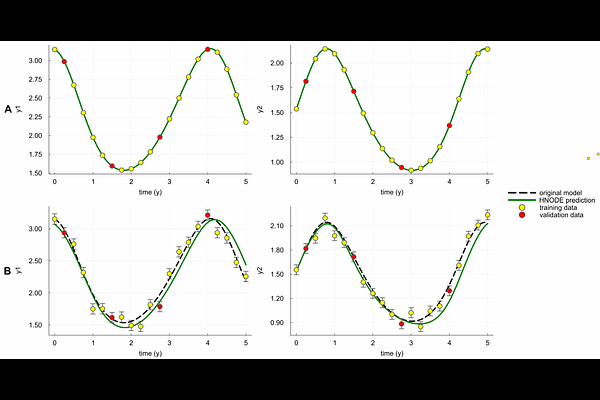Robust parameter estimation and identifiability analysis with Hybrid Neural Ordinary Differential Equations in Computational Biology

Robust parameter estimation and identifiability analysis with Hybrid Neural Ordinary Differential Equations in Computational Biology
Giampiccolo, S.; Reali, F.; Fochesato, A.; Iacca, G.; Marchetti, L.
AbstractParameter estimation is one of the central problems in computational modeling of biological systems. Typically, scientists must fully specify the mathematical structure of the model, often expressed as a system of ordinary differential equations, to estimate the parameters. This process poses significant challenges due to the necessity for a detailed understanding of the underlying biological mechanisms. In this paper, we present an approach for estimating model parameters and assessing their identifiability in situations where only partial knowledge of the system structure is available. The partially known model is extended into a system of Hybrid Neural Ordinary Differential Equations, which captures the unknown portions of the system using neural networks. Integrating neural networks into the model structure introduces two primary challenges for parameter estimation: the need to globally explore the search space while employing gradient-based optimization, and the assessment of parameter identifiability, which may be hindered by the expressive nature of neural networks. To overcome the first issue, we treat biological parameters as hyperparameters in the extended model, exploring the parameter search space during hyperparameter tuning. The second issue is then addressed by an a posteriori analysis of parameter identifiability, computed by introducing a variant of a well-established approach for mechanistic models. These two components are integrated into an end-to-end pipeline that is thoroughly described in the paper. We assess the effectiveness of the proposed workflow on test cases derived from three different benchmark models. These test cases have been designed to mimic real-world conditions, including the presence of noise in the training data and various levels of data availability for the system variables.